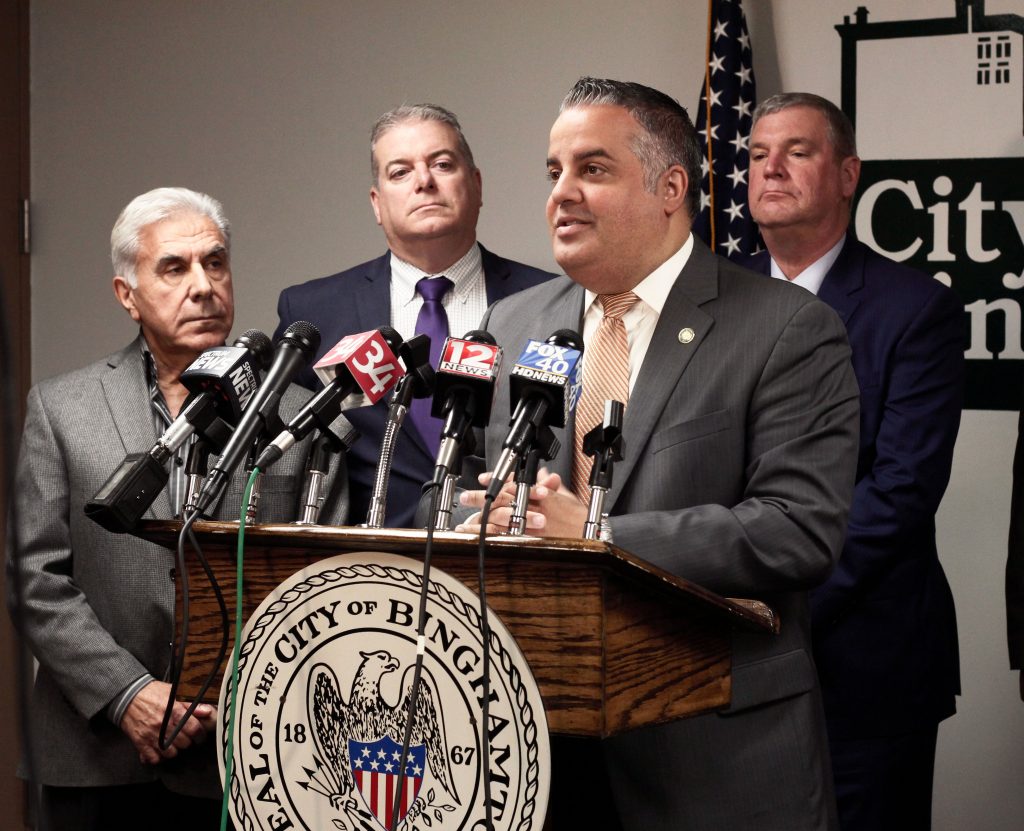
Carnegie Library, located on Exchange Street in Downtown Binghamton, was built in 1903 and is scheduled to be renovated as a space for Broome Community College’s new Culinary Arts Center. According to Binghamton Mayor Rich David, those plans are currently stalled and could be completely derailed by tax reform plans in Washington, D.C.
In a press conference Tuesday, David expressed his concerns about changes to the tax code currently being discussed in the House of Representatives and Senate that would put an end to the state and local tax deduction and the historic tax credit.
The state and local tax deduction was established in 1913 and is one of the oldest tax codes still in use in the United States. It allows filers to itemize their deductions, rather than claiming the standard reduction, and deduct either the amount of state and local property, sales or income taxes paid over the course of a year, lowering the amount of income taxed by the government. The House tax bill would eliminate the deduction for income and sales taxes, and limit the deduction to $10,000 for property taxes, while the Senate tax bill would eliminate the deductions entirely.
David, who previously voiced his opposition to the tax reform plans at the New York Conference of Mayors in Albany on Nov. 13, said the reforms unfairly target citizens of highly taxed states like New York, New Jersey, Maryland and California.
#Binghamton @MayorRichDavid said elimination of #SALT will cost average homeowner in his city about $2,600. And the repeal of historic tax credits would hinder development of blighted properties. “The loss will set us many steps backwards.” pic.twitter.com/vjUynDKIfu
— NY Conf. of Mayors (@NYMayors) November 13, 2017
“People in New York state and the city of Binghamton and Broome County shouldn’t be paying more, or have their deductions jeopardized so tax relief can be provided elsewhere across the nation,” David said. “That’s not fair.”
According to The Pew Charitable Trusts, in 2015, 29.8 percent of filers nationwide used state and local tax deductions, and in New York, 34.6 percent of filers claimed an itemized deduction, saving them an average of $12,707. According to David, the tax reforms will hit the middle class hard and could have a big impact on Broome County.
“This is a common deduction that many people take advantage of, and its elimination will have a significant impact,” David said. “The number of [state and local tax] deductions per congressional district in this 22nd District is 62,530 deductions, so that’s a significant amount.”
In addition to the state and local tax deduction, the historic tax credit would also be excluded from Republicans’ tax reform plans. Historic tax credit, added as a federal tax code in 1986, incentivizes the rehabilitation of historical buildings by providing a 20 percent credit on projects that renovate or preserve them. The tax credit, which applies after the project is completed, is one of the ways cities finance expensive renovations. In the city of Binghamton, the redevelopment of the Carnegie Library, the Binghamton Masonic Temple, the Grand Royale Hotel and the Stevens Square building could all be put in jeopardy by the loss of the historic tax credit, David said.
“Many of these buildings are so decrepit that they are beyond the point of repair, unless these tax credits are utilized,” David said.
Other local leaders, including Sen. Fred Akshar; Kevin McManus, deputy Broome County executive; and Jason Andrews, superintendent of the Windsor School District, have also spoken out against the proposed tax reforms. Assemblywoman Donna Lupardo wrote in a statement that she strongly opposed the bill.
“The elimination of the state and local tax deductions would be devastating for families in my district,” Lupardo wrote. “To add insult to injury is the proposed elimination of historic tax credits, which are critical to many of the redevelopment projects happening throughout the state.”
Read more from Pipe Dream News:
TEDxBinghamtonUniversity selects student speaker for spring event
Dickinson Community adds VPMA to town council
In Their Shoes’ event educates attendees about domestic violence


